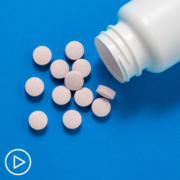Recovering From CAR T-Cell Therapy | What Can Myeloma Patients Expect?
Recovering From CAR T-Cell Therapy | What Can Myeloma Patients Expect? from Patient Empowerment Network on Vimeo.
What can myeloma patients expect after undergoing CAR T-cell therapy? Myeloma expert and researcher Dr. Beth Faiman discusses returning to life after the CAR T process, advice for physical activity, and immune system concerns during recovery.
Dr. Beth Faiman is an Adult Nurse Practitioner in the department of Hematologic Oncology and Blood Disorders at the Cleveland Clinic. Learn more about Dr. Faiman.
See More From Thrive CAR T-Cell Therapy
Related Resources:

|

What Side Effects Are Possible Following CAR T-Cell Therapy? |

|
Transcript:
Katherine Banwell:
Beyond monitoring of any issues, what can someone expect related to returning to life as they knew it before the diagnosis? Is there a timeline for resuming lifestyle and activity?
Dr. Beth Faiman:
Yeah. So, I should say I because it’s from my perspective. I am a real strong advocate. I tell people to do what you feel like you can physically do. We know that myeloma can affect the bones and put your bones at risk for breaking and so we give you medicines to protect it. So, I do put some restrictions however on physical activity in terms of, “I don’t want you to bench press 40 pounds or 20 pounds,” in most cases. And depending on what the bones look like on x-ray, I’ll even restrict it to about five to 10 pounds.
If you think about it, that’s a bag of potatoes. So, you don’t want to put too many restrictions on for everybody. But talk to your healthcare provider about what your specific restrictions are with physical activity. Because I don’t really put any restrictions on but I encourage things like riding a bike, especially a stationary bike in your own home, so that if you fall off – hopefully, you won’t fall off a stationary bike. But if you injure yourself, then you’re able to be in a place that somebody can help you.
But riding a bike. Also, exercising in water. Water therapy is a great weight bearing exercise and there are times of day where you can go when the YMCAs or YWCAs aren’t as busy – or community centers. So, you’re less at risk for bacterial or other illnesses. But during that first month, I try to limit their exposure to people because you’re at risk for the different viruses that are all over the place, the bacterial infections.
So, that first month is the critical period where I try to say, “Okay, try to lay low. Let’s get you through this period. Your immune system will start getting stronger on its own after this period.” And then, that month two you start feeling like doing more. You go to the grocery store. You maybe go to eat out at a restaurant but pick a time of day that’s less busy. So, go for an early dinner. There’s no shame in eating at 5:00 p.m. if you want to go out. And then, get a table in the corner with your own wipes. And so, that’s where your immune system is getting stronger.
And then, by month three, I think most people will feel much, much better and much, much stronger. And if you can keep moving throughout this whole time, then you’ll be stronger on the way out.









